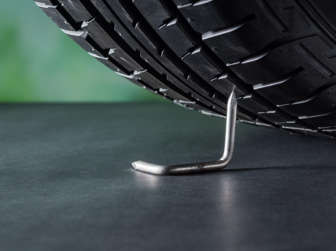If there’s one car part you never want to fail, it’s your brakes. The great thing about brakes is that they are relatively simple and easy to look after. They are quite easy to monitor as well which means that you can be aware of any potential problems as soon as they start developing so you can get them fixed.
There are a few things you can do to ensure the good health of brakes. One of the most important and obvious preventative steps is to ensure your car is serviced at the correct intervals which are outlined in the service booklet that comes with your car. A service plan through MotorHappy helps you budget for your car services, ensuring your vehicle is always in top condition.
Signs your car brakes need repairing:
Modern brakes are so efficient that they can almost never be heard over the engine noise even when fully applied at high speeds. If your car's brakes are making noises then it means that either the brake pads have worn out or something is broken and/or out of place. A screeching or hissing sound is an indicator that the brake pads need immediate replacing. If a metallic grind is heard then it means that things have gone too far and the brake disc is beginning to suffer permanent damage.
Braking stability is an important aspect of any driving experience. What this means is that the car should brake in a straight line. If the car is pulling to the left or to the right or is even twitching slightly under braking then it indicates trouble with the braking system. This could be due to one of the brakes going out of alignment or an issue with the hydraulic system. At the first sign of such an imbalance, have the car checked and fixed by a certified professional.
Locking up refers to one or more wheels coming to a complete stop and starting to slide under braking. This can happen when the brakes start applying uneven pressure. Usually, one brake will end up applying a bit too much-stopping force causing that wheel to lock up and lead to a slide. If this happens regularly on your car even under light braking, then it is definitely pointing towards an issue with the braking system.
The brake pedal is all you have when it comes to feedback. It should be effectively able to convey the amount of force being applied by the brakes, how much braking power is left and how close the tires are to losing grip. If your brake pedal suddenly starts to give all the wrong signals then it could be the brakes beginning to act up. An example of this would be the brakes not at all acting initially when the pedal is depressed and suddenly applying all its braking power.
Braking, especially under panic, is all about intuition. After driving a particular car for a decent amount of time, knowing how much braking needs to be done becomes second nature. If you suddenly find your car behaving erratically and applying more braking force or less braking force than what you intended on a regular basis then it again means that there is something wrong with it. Usually, most issues, in this case, will be temporary and easily fixable, but it should not be ignored.
An advantage of living in the modern age is that our cars have become quite intelligent. Every car today comes with some sort of warning system to let you know when something is wrong. Never ignore a warning light. If your car has a dedicated brake warning light then you can get it checked immediately. In other cars, there is a single all-purpose warning light. Either way, get your car checked by an authorised professional.
Things you can do to ensure good brake health:
This might seem like the unimaginative way to drive but if you want your braking system to last long and if you want to minimise the chances of a brake failure then drive in a manner where sudden and hard braking is kept to a minimum. Judge your stopping points well in advance and brake in a gentle and gradual manner rather than in a sudden and abrupt manner. This will save the brakes and help you avoid any uncontrollable situation like a slide or lockup.
One of the best feelings of driving a car is cornering. However, it needs to be done correctly both to ensure the longevity of the brakes as well as your safety. Almost every corner will require you to slow down. It is paramount to ensure that you do all the braking before entering the corner. There should be no braking mid-corner. You should be at the right speed from the very beginning of the corner. Braking in the middle of a corner can make the car unstable while also putting undue stress on the brakes and this is the most common cause behind brakes going out of alignment.
This is a tendency of drivers when they encounter heavy traffic. The brake is partially depressed even when the car is moving. There is no need for this. When the car is not accelerating, the engine will automatically slow the car down due to engine braking. If that is not enough then engage a lower gear but never ride the brakes as they cause a lot of wear and tear on the brake pads and liners.
As a continuation of the last point, engine braking is the natural tendency of a car to slow itself down when the throttle pedal is not depressed at all. Instead of using the brakes all the time, take as much assistance from engine braking as possible. This will not only save the brakes but also help you to achieve a greater fuel economy. It is savings both in the short and long term.
Do you understand how Car Insurance excess works?
Ineos Grenadier: A powerful new SUV on SA’s roads


